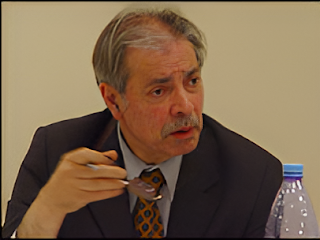Mehrdad Farahmand - BBC Persian - May 17, 2004
On Sunday, May 16, a seminar titled The Role of Iranian Ethnic Groups in Establishing Democracy and Iran's Future Policies was held in London.
This one-day seminar, hosted at the Polish Center in London and attended by over ninety participants, featured representatives from the Awakening Movement of Azerbaijan, the Democratic Party of Iranian Kurdistan, the Ahwaz Democratic Solidarity Party, and the United Front of Iranian Balochistan. Additionally, independent political and ethnic figures gave speeches, and a message was read on behalf of the Organization of the Majority Fadaiyan of the Iranian People.
Contributions to the seminar also included speeches by Dariush Homayoun of the Constitutional Monarchist movement and Hossein Bagherzadeh, a prominent republican political figure.
The speeches criticized the policies of both the Pahlavi monarchy and the Islamic Republic regarding ethnic groups, particularly their deprivation of rights. Furthermore, some speakers proposed solutions for securing the rights of Iran’s ethnic groups in the country’s future.
The topic of federalism and the establishment of a democratic and federal Iran was widely supported by most speakers and participants at the seminar.
Despite the significant presence of representatives from active groups focused on ethnic issues in Iran, tensions and disagreements arose during the seminar. This was particularly evident during the concluding session, which was dedicated to a Q&A segment.
Some groups that were not officially represented at the seminar, such as the World Azerbaijan Congress and the Committee for the Defense of Southern Azerbaijan’s Rights, expressed grievances about not being given the opportunity to share their perspectives.
However, Abdul Sattar Doshoki of the United Front of Iranian Balochistan, who organized the seminar, stated that a specific framework had been established for inviting groups to participate. He explained that some groups were not invited because their goals and agendas fell outside this framework.
 |
| Abdolsattar Doshoki, as the organizer of the seminar, had only invited groups that were committed to the territorial integrity of Iran and lacked separatist tendencies. |
According to Mr. Doshoki, this framework required acceptance of the unity and territorial integrity of Iran. He noted that some ethnic groups openly advocate for the separation of parts of Iran and their independence or annexation to neighboring states, which was incompatible with the seminar’s objectives.
Dariush Homayoun’s participation in the seminar as a prominent figure in the Iranian monarchist movement and his past as an official in the Pahlavi monarchy was one of the most contentious aspects of the gathering.
Mr. Homayoun’s background, given his association with a government heavily criticized by political groups advocating for ethnic rights due to its centralist policies before the revolution, and his views emphasizing national unity and a single Iranian identity despite the country’s ethnic diversity, made him the target of intense criticism from some attendees.
 |
| The presence of Darius Homayoun and the presentation of his viewpoints led to significant debates and controversies at the seminar. |
Nevertheless, Dariush Homayoun defended the principle of respecting ethnic rights and equality. He also introduced a proposal from the Constitutional Party of Iran for a system of local governments in which the administration of each province would be managed by its own residents, with executive officials accountable to local councils.
The seminar on Iranian ethnic groups in London was notable for facilitating open dialogue among a wide range of political activists representing Iran’s ethnicities and for providing a platform for diverse perspectives. However, it also highlighted the significant gap that remains before these groups can reach consensus and present a cohesive plan.
Despite these differences, the seminar demonstrated a shared commitment among all groups—from those with ethnic orientations to monarchists and republicans—to international covenants defining and protecting ethnic rights. Moreover, there was unanimous agreement on pursuing these rights through peaceful means.
The link to the original article in Farsi on BBC Farsi:
سمينار نقش اقوام ايرانی در آينده ايران

